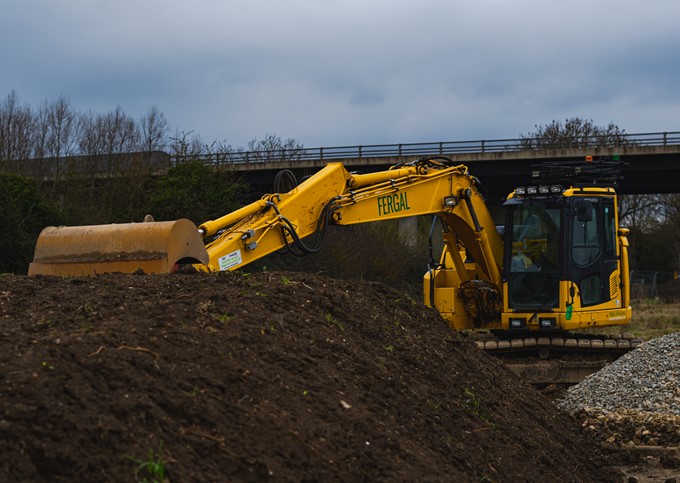Saving... Please wait..!
Global Energy Show 5x5 Series
Unique Climate Adaptive Strategies in Oil and Gas
As climate change-related risks are becoming an increasing global issue, it’s essential for companies such as those in the oil and gas industry to do their due diligence through adaptive management practices.
B&A Planning Group is a leading community and land development firm in Western Canada that influences the energy industry by developing climate-adaptive strategies and driving a cleaner energy system.
Nathan Petherick, a partner at B&A Planning Group, sat down with Rachel Gregory, Digital Host at The Global Energy Show, to discuss how his company helps energy companies meet municipal regulations, create monitoring programs and enhance climate change adaptation strategies.
Global Energy Show - Nathan Petherick, Partner, B&A Planning Group
Developing Adaptive Climate Strategies in New Communities
Rachel: What kind of services has B&A provided for the energy industry?
Nathan: Regarding our monitoring program, we've effectively brought operators, municipalities, landowners, and developers together to ensure safe development in the pipeline system while using the received information to support operator awareness.
As a planning firm specializing in a lot of land development work through Western Canada, we've been looking to push energy providers towards a cleaner energy system and help through a relationship with governments to secure those necessary approvals. We're also looking at developing adaptive climate change strategies in our new communities and using some of those measurements to assess the current and future risks and their successes as these communities move forward.
B&A’s Unique Custom Monitoring Program
Rachel: Can you expand a bit on what B&A’s custom monitoring program is?
Nathan: Municipality practices and awareness of energy infrastructure varies by jurisdiction; traditional click before you dig programs that have been very successfully implemented by the energy sector are not sufficient unto themselves to advance early awareness of adaptive land use strategies and development change.
When we look at our monitoring program, the relationship with municipalities, landowners and developers and the successful implementation of that program helps build early awareness well in advance before any shovels hit the ground.
We assist operators in understanding jurisdictions where their pipeline infrastructure is located. Once that is understood, we develop cost-effective customized programs with those impacted jurisdictions to communicate information requests as to what the operator would like to be engaged in.
Once we receive those applications from the municipality, we work with an operator to understand the potential implications. These implications might pose from a damaged prevention class impact crossings land perspective. We then work with operators to formulate responses to those municipalities and capture information that might be important in their own monitoring systems to create a balanced risk management strategy.
How Custom Monitoring Programs Add the Greatest Value to the Energy Industry
Rachel: Where do you see this adding the greatest value?
Nathan: Our customized monitoring programs have been adapted to meet energy companies' specific needs. That's helped enhance foresight, bolster integrity management, and damage prevention initiatives to enable predictive modelling and advance change. Ultimately, this supports regulatory and standard compliance whilst also enhancing capital and adaptation planning processes.
Additional Opportunities For Land Use Planning
Rachel: Where do you see additional opportunities besides land use planning consideration within the energy sector?
Nathan: Based on the increasing importance of renewable energy initiatives, we see further opportunity to support energy providers through sighting and due diligence investigations through supportive engagement programs and in securing necessary municipal approvals to support land and facility development.
We also see an opportunity to undertake preemptive risk assessments on pipelines networks and surrounding lands. This will support predictive class modelling as a supplemental approach to traditional monitoring programs to support operators, damage prevention, integrity, class, climate risk management and more monitoring programs. We also see an opportunity to assist operators in integrating best management practices pertaining to the oil and gas industry in pipeline systems through municipal engagement.
Lastly, we see an opportunity to help operators respond to regulatory and standard requirement changes to better understand the potential impact of these changes. This includes their appropriate responses to managing climate change risks so we can assist them in devising potential solutions to get ahead.
Key Benefits of B&A’s Engagement in the Energy Sector
Rachel: What are the benefits of engaging in this type of work?
Nathan: Our work with the energy sector has provided numerous benefits. This includes, supporting land acquisition and disposition decision making processes, providing assistance with overall risk management framework, helping secure necessary approvals to ensure land projects and facilities have appropriate approvals in place, helping enhance municipality and developer collaboration with energy providers, supporting early awareness to land use and development change and proximity to energy infrastructure, providing knowledge and foresight to support mitigation efforts and capital planning strategies.
Lastly, it provides benefits to assist operators in meeting regulatory and standard obligations.
Rachel: Well, thank you so much Nathan, for taking time to chat with me today and to chat out about the B&A planning group and your role within the energy industry.
Learn More About the Future of Custom Monitoring Programs for Land Development

Climate adaptive strategies are becoming increasingly important throughout land development processes. Meeting obligations in specific municipalities, determining identified risks such as climate risks and reducing greenhouse gas emissions are growing concerns within the energy industry.
If you're interested in learning more about topics like custom monitoring programs in land development from those actively changing the game in North America's energy industry, register for the next Global Energy Show today.
Climate Adaptive Strategies in Oil and Gas | Energy Industry Services | Global Energy Show
Beware of email scams
DMG Events has been informed from several exhibitors are receiving scam emails . Please be aware these offers are fraudulent. These scammers do not have any relationship with DMG Events.In accordance with GDPR, CASL and other jurisdictional data privacy regulations, DMG Events will never sell your data to any third party organisations. Please see our Privacy Policy for more information regarding how DMG Events will process and store your information.







